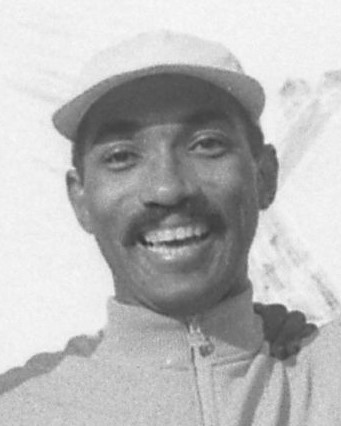1. Early Life
Gregory Foster was born in Chicago, Illinois, on August 4, 1958.
2. Athletic Career
Gregory Foster's athletic career was marked by numerous collegiate, national, and international victories, consistently placing him among the world's top hurdlers despite facing challenges.
2.1. College and National Achievements
Foster was a prominent collegiate athlete for UCLA. He secured two NCAA outdoor championships in the 110 meters hurdles (1978 and 1980) and was the NCAA 200 meters champion in 1979. He also claimed 10 U.S. national titles throughout his career. Four of these were outdoor titles in the 110 meters hurdles (1981, 1983, 1986, and 1987). His six indoor national titles included the 60 yard hurdles (1983, 1984, 1985), 55 meters hurdles (1987, 1988), and 60 meters hurdles (1991). In 1978, while competing for UCLA, Foster set an American record in the 110 meters hurdles with a time of 13.22 seconds at the NCAA Championships. This time was, at that point, second only to the world record held by Alejandro Casañas of Cuba. Foster's collegiate mark stood as an NCAA meet record for decades and remains a UCLA record as of 2022.
2.2. International Competitions and Major Wins
Foster's international career was highlighted by his dominant performance in the World Championships, where he uniquely won three consecutive gold medals in the 110 meters hurdles. These victories came in 1983 in Helsinki, 1987 in Rome, and 1991 in Tokyo. This achievement placed him in an elite group alongside Carl Lewis (100 meters) and Sergey Bubka (pole vault) as the only athletes to secure three consecutive World Championship titles during a period when the event was held every four years, demonstrating his strong competitive nature.
He earned a silver medal in the 110 meters hurdles at the 1984 Los Angeles Olympics. However, despite his success, Foster had limited Olympic appearances, failing to qualify for both the Seoul Olympics and the Barcelona Olympics through the domestic selection trials.
Beyond the World Championships and Olympics, Foster also achieved significant victories in other major international events. He was the champion of the 1981 IAAF World Cup in Rome, winning the 110 meters hurdles with a time of 13.32 seconds. In 1986, he won gold in the 110 meters hurdles at the Goodwill Games in Moscow. Furthermore, he secured a gold medal in the 60 meters hurdles at the 1991 World Indoor Championships in Seville, with a time of 7.45 seconds.

2.3. World and Personal Records
Gregory Foster held and set several notable records in hurdles. In 1985, he broke the world indoor record for the 50 meters hurdles, achieving a time of 6.35 seconds, a mark he later tied in 1987. He also set a new world indoor record for the 60 meters hurdles in 1987, running a time of 7.36 seconds on January 16.
His personal best time for the 110 meters hurdles was 13.03 seconds, achieved on August 19, 1981, at the Weltklasse Zürich meet. In that race, Renaldo Nehemiah made history by becoming the first man to break the 13-second barrier with a time of 12.93 seconds, which again positioned Foster as the second-fastest hurdler of all time. Foster's personal best for the 200 meters was 20.20 seconds, recorded on April 28, 1979.
2.4. World Rankings
Foster demonstrated remarkable consistency throughout his career, being ranked among the top ten hurdlers in the world for 15 out of 16 years, spanning from 1977 to 1992. During this period, he was ranked as the world's number one hurdler for five different years: 1982, 1983, 1986, 1987, and 1991.
2.5. Doping Suspension
In 1990, Gregory Foster faced a six-month suspension from athletics after a doping test yielded a positive result for ephedrine. Foster stated that the substance was present in his asthma medication.
3. Retirement and Honors
Following a distinguished career, Gregory Foster retired from competitive athletics and received significant recognition for his contributions to the sport.
3.1. Retirement
Gregory Foster officially retired from competitive athletics in 1996.
3.2. Hall of Fame Induction
In recognition of his numerous achievements and lasting impact on track and field, Foster was inducted into the USATF Hall of Fame in 1998.
4. Personal Life, Health Issues, and Death
Beyond his athletic pursuits, Gregory Foster faced significant personal health challenges towards the end of his life.
4.1. Health Issues
From 2015 until January 2020, Gregory Foster suffered from amyloidosis, a rare and life-threatening disease known to cause considerable damage to the heart. Despite battling this severe condition, he continued to contribute to the sport by coaching and mentoring the next generation of athletes. On January 18, 2020, Foster underwent a heart transplant surgery at Barnes-Jewish Hospital.
4.2. Death
Gregory Foster passed away on February 19, 2023, at the age of 64.
5. Track Records
As of September 7, 2024, Gregory Foster held the following track records for 110 meters hurdles at various locations:
| Location | Time | Windspeed | Date |
|---|---|---|---|
| Berkeley, California | 13.29 | 0.2 mph (0.1 m/s) | 1982-06-12 |
| A Coruña | 13.15 | 3.6 mph (1.6 m/s) | 1990-07-26 |
| Lappeenranta | 13.11 | 2.7 mph (1.2 m/s) | 1991-07-09 |
| Lemoore, California | 13.39 | 1.8 mph (0.8 m/s) | 1982-05-08 |
| Los Angeles | 13.19 | 1.1 mph (0.5 m/s) | 1984-06-18 |
| Malmö | 13.12 | -1.1 mph (-0.5 m/s) | 1991-08-05 |
| Riccione | 13.33 | 2.7 mph (1.2 m/s) | 1985-08-31 |
| San Jose, California | 13.15 | 6.9 mph (3.1 m/s) | 1987-06-25 |